“She’s okay what. Look at her. Does she not look okay?”
When my parents’ divorce was finalised and the relatives were informed, I was a topic of discussion at the lunch table.
Not fully knowing the weight I was trying to carry on my own, I smiled back in agreement with them – because I wanted to be okay too.
At that time, I don’t think anyone in the family was familiar enough with the rough terrain of divorce to help me navigate it.
It was easier for us to talk about my results, which secondary school I should go to – talk around the elephant in the room – instead of discussing how I should process my emotions or think about my new “broken” family.
I wanted to defend the decision made by my parents by proving that I was fine and that they shouldn’t be blamed.
I was trying to be my own grown-up, but I was really just an anxious child trying to scare off the monsters by standing on shaky stilts, hiding in clothes too big for me.
 So how bad is the effect of divorce on the children? Can young children still “turn out well” after their parents’ marriage ends? Do children of divorce fare worse academically or relationally?
So how bad is the effect of divorce on the children? Can young children still “turn out well” after their parents’ marriage ends? Do children of divorce fare worse academically or relationally?
For a long time I was interested in the answers to those questions too. I wanted to know if I’ll be “okay”. I can’t actually remember if my parents ever told me that I was gonna be okay. Maybe they didn’t, because they weren’t sure of it themselves too.
As a kid then, I was oddly “okay” with my parents’ divorce. And I saw it coming. I don’t recall asking them to stay together, since I was also of the view that that they shouldn’t – they weren’t happy together anyway. My young self believed wholeheartedly that it was “for the better”.
Then, I realised that all these questions and perspectives about divorce reveal a more concerning problem: Are we missing the mark on the significance of marriage? Can divorce really be “for the better” if we can be assured that the children will be fine?
The effects of divorce tend to show up in other areas – a weak sense of self, a broken view on love and divorce, an inability to trust fully.
What I didn’t know was that no matter how “okay” I was with it, the trauma will be no less significant.
What I knew as home was disintegrating into fragments – the divide between my parents was a chasm opening inside of me, beyond my line of sight.
For children of divorce, the changes we experience are neither just situational nor superficial – they’re deeply real. And their effects may not show up all the time in our grades, a CT scan, or in our social functioning.
The divorce couldn’t change my biological-belonging to my parents, so I now had two separate realities that I didn’t want to have to deal with. But on the inside, I wanted a do-over – a restart, please – a different life altogether.
You see, the effects of divorce tend to show up in other areas – a weak sense of self, a broken view on love and divorce, an inability to trust fully …
At least, that was my experience.
 As an only child, I wanted an older sister. It was almost purely so I wouldn’t have to go through my parents’ divorce alone, so that it didn’t feel like it was little me against the world.
As an only child, I wanted an older sister. It was almost purely so I wouldn’t have to go through my parents’ divorce alone, so that it didn’t feel like it was little me against the world.
I didn’t want to be defenceless; I felt attacked every time someone talked about either one of my parents – I felt lacking because I didn’t have a dad and mum who were referred to as a pair, a team – and that meant neither was I part of something whole.
I needed someone else I could turn to in the fallout of my nuclear family. I would’ve asked my older sister what was happening to us – and how do we make sense of it?
The divorce was an event set into motion by signatures on sheets of paper. But the breaking apart of something that was once joined will always entail a great shattering and pieces to be picked up.
In my own growing up by trial and error, in my fearful picking-up-of-pieces, I realised that I wanted a sibling because I was really looking for perspective, and for direction. With the permanent loss of my parents as one entity, it meant that I no longer had a safe place – and I was lost.
It was obvious what was happening on the outside – my parents no longer wanted to be together. But on the inside, there was an upheaval that couldn’t be resolved with a simple pair of signatures.

I didn’t feel the full force of my parents’ divorce in me until much later, when I went through my first major break-up.
“We are searching for a sense of home, a way to convince ourselves the lies in our abandonment and loneliness won’t have the last word.” (Paul Maxwell, To the sons and daughters of divorce)
The words of Paul Maxwell provided the language I needed to explain to myself what I’d been struggling with all these years; I was searching for a sense of home.
But my blooming identity crisis meant that I was in no position to see things clearly. I didn’t know who I was or what I even wanted.
I thought that maybe if I tried hard enough, if I looked for the “right” person, my new home – my new belonging as found in a person – would be indestructible, unlike the one I had.
But at the same time, I admittedly picked at my relationship like the big bad wolf who tried to blow the house down, because I needed to see if it would hold up.
I was in constant confusion. My destructive thoughts, feelings and actions should have been a big warning sign to stop what I was doing – “DO NOT PROCEED” – but I was so close to finally having a sense of home that I couldn’t bear it.
Eventually, the house was blown down like one made of straw.
 As I picked up the pieces of my own break-up, I could strangely see myself better. Maybe I was growing into the clothes once too big for me, maybe I was getting better at seeing things from a mature standpoint, with no more need for stilts.
As I picked up the pieces of my own break-up, I could strangely see myself better. Maybe I was growing into the clothes once too big for me, maybe I was getting better at seeing things from a mature standpoint, with no more need for stilts.
In the familiar wake of heartbreak, I realised that the source of my struggles came mostly from my sense of self. It might sound funny but my deepest question over the years was ,”Who am I, really?”
As a prideful child who only knew how to speak the language of “I’m okay and I’ve got it all together”, I didn’t know how to ask for help. Perhaps at several important junctures of my life, I should’ve raise my hand, the way we were taught to at zebra crossings, so that someone could see me – and all my confusion – clearly.
But that wasn’t in any school syllabus – so it took me more than a decade before I got hold of some language to help me express and process my parents’ divorce.
We don’t have to live our whole lives crippled, even if our growth was somehow stunted in our childhood.
Psychologist Erik Erikson sees the development of a person in stages, and success at each stage helps the person better take on the challenges in the next. He believes that the basic conflict in adolescence (12-18 years old) lies between identity and role confusion. If a child is confused about his identity, it leads to a “weak sense of self”.
Since the development is cumulative, a weak development (e.g. sense of self, independence, or competence) in earlier stages may mean a reduced ability to do well in further stages, when one has to build intimacy for committed relationships.
But it doesn’t mean that it cannot be made up for.
It means that we don’t have to live our whole lives crippled, even if our growth was somehow stunted in our childhood. The pain of our parents’ divorce is real, and it’s not the kind of pain you can easily heal with a just-get-over-it band-aid.
But it’s possible.

One night this year, I took out my big old reel of painful memories and played it in my mind again.
It was extensive. I wondered if there was anything I could do about it, but I didn’t see how it was possible unless there was a way to undo the past.
How does one fix a marriage that was supposed to last a lifetime?
This was a routine I was well-accustomed to: Holding onto my pain, keeping it in a box and opening it once in a while to remind myself of why I am the way I am.
It was an equal mix of self-loathing and self-pity – downright scary.
But that night, I was asked if I was going to keep doing this for the rest of my life. And the one with the question was none other than God, again.
Even though I’d allowed Jesus into my life somewhere in my teenage years, I hadn’t let go of my past. I was still old on the inside, while trying to be new on the outside. No wonder I kept walking down old paths of pain.
“Therefore, if anyone is in Christ, the new creation has come: The old has gone, the new is here!” (2 Corinthians 5:17)
Christ offers a new life to anyone who would believe in Him. A new life that is not weighed down by the consequences of choices – others or mine – made in the past.
How should I put it? It’s not self-help at all, it was help from God Himself, with all the power that only He brings, so that I could trade in my old life for a new one.
It was Him who saw me clearly all this while, even when I didn’t know how to raise my hand.
Though I did try, there was nothing I could do to help myself other than gratefully placing my life into the safe hands of a God who loves me.
So that night, instead of telling Him all the reasons why I thought my life sucks and how it wasn’t possible that I could live any differently, I quietened down and listened to His love for me.
 I still had one thing to resolve about divorce: My acceptance of it.
I still had one thing to resolve about divorce: My acceptance of it.
Many years ago, somewhere near Christmas time, a couple from the same church as me shared their story of adultery, forgiveness and reconciliation.
Sitting in the audience, listening to their story, I thought that it was crazy. Their story did not end in divorce! And I remember thinking that I’d never be able to find enough strength in myself to forgive that way.
And it made me realise that all this while, I believed in divorce as a solution.
To me, marriage only meant that there was a chance for something precious to be taken away from me. So even though I searched for love, I was incredibly fearful of it.
“Why would people vow to love each other for the rest of their lives? Why would anyone think they could keep a promise like that?”
These were just some of the questions I had towards marriage as an institution in our world. It befuddled me that despite the many failures of it, marriage is still popular, that people would still choose to enter into a contract with rising dissolution rates.
But I had to also ask myself which view of marriage I was subscribing to: Was it biblical or practical?
I had to orient myself with the biblical view of marriage – designed by God to reflect the way He loves us.
With that in mind, the wild vows of marriage make sense to me now, because I know that God keeps those same vows toward me.
In His eyes, it is not so much a contract as it is a covenant. And He keeps His covenant of love perfectly.
Sometime this year, God reminded me of that couple’s story and my response to it all those years ago.
The wild vows of marriage make sense to me now, because I know that God keeps those same vows toward me. In His eyes, it is not so much a contract as it is a covenant.
A sudden question confronted me that afternoon: Should I come face-to-face with adultery in my marriage one day, would I stay put in the marriage instead of choosing a divorce?
My response was equally sudden. My heart lunged out, almost surprising me, a yes in agreement with my mind.
Holding onto love as a covenant – the highest of all promises – that’s the kind of bewildering love that Christ first showed us and now calls us to:
“Love is patient, love is kind. It does not dishonour others, it is not self-seeking, it is not easily angered, it keeps no record of wrongs. It always protects, always trusts, always hopes, always perseveres.” (1 Corinthians 13)
Impractical? Maybe. But definitely biblical. And the sort of love I’d want in on.
And that became the day the child who was “okay” with her parents’ divorce renounced divorce as a solution in her own life – come what may.
I knew that my answer was significant. Should I one day make a decision to attempt to love another person in marriage, I know that my future no longer rests in the history of relationships in my family.
Honestly, it doesn’t matter whether I’d eventually be married or not. The far more precious lesson I’ve learnt is that God’s love will never fail me. And that is my confidence.









